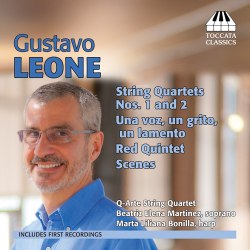|

Support us financially by purchasing
this disc through MusicWeb
for £10.50 postage paid world-wide.

|
Gustavo LEONE (b.1956)
String Quartet No.1 (1995) [19:05] ¹
String Quartet No.2 (2009-10) [20:09]
Una voz, un grito, un lamento (2006) [8:35]
Red Quintet (2002) [10:19] ²
Scenes (2011) [14:23]
Q-Arte Quartet
Beatriz Elena Martinez (soprano) ¹
Marta Liliana Bonilla (harp) ²
rec. July - December 2011 and December 2012 (Red Quintet), Biblioteca Luis Ángel Arango, Bogotá
TOCCATA TOCC 0168 [72:33]
Gustavo Leone was born in Buenos Aires in 1956 and began professional life as a classical guitarist. Graduate compositional studies took him in 1987 to Chicago at the University. He is now a professor of music at Loyola University in the city and is strongly active as educationalist and composer.
Toccata’s blurb sounds good, promising music with ‘atmosphere with a feeling for drama, its basic lyricism coloured with echoes of folk-music and the Baroque and animated by outbreaks of dancing energy.’ I recognise some of that, certainly, though not consistently throughout this 72-minute disc of which everything except the Red Quintet is heard in first recordings. The first Quartet was composed in 1995. The notes suggest a surrealistic tack, though impressionist is as often nearer the mark in music that is approachable, and generates driving intensity as well as taut moments, and thriving on strong conjunctions of texture and rhythm. In the second of the two movements Beatriz Elena Martinez sings Le Chant de Mort, the surrealist poetry of the Belgian writer and artist Henri Michaux (1899-1984) which leads to free variations and a moment of dramatic parlando at the words ‘Il est temps. Viens’.
The Second Quartet followed a number of years later, being completed in 2010. It’s cast in one movement though there are five recognisable sections. The folkloric aspect is perhaps more noticeable here, as are pizzicato episodes and the more terse, acerbic aspect of things. It’s certainly a more tensile work than the earlier Quartet and this includes some slithery sonorities and a vaguely chugging, not-quite-minimalist section in which things are statically repeated. It quietens to end, though for me there is too profuse a sense of edgy changeability and not enough is allowed to grow incrementally. Scenes (2011) is based on an earlier work - a one-act opera called The Leader which was written for five voices, actor and string quartet. There are three ‘scenes’ and they are fast-paced and exciting, quite romantically and richly-voiced, and finally more angular and exciting. The Red Quintet is for harp and string quartet in which the diaphanous and the driving are happily integrated, not without a moment or two of genuine sentiment, eagerly swept away in ensuing drive. Una voz, un grito, un lamento is again tripartite, and this seems the most bleak of the works, individual voices crying out whilst scuzzy string sonorities drive on. Leone says that the contrasting sections represent and embody the work’s title, namely ‘voice’, ‘scream’ and ‘lament’. It’s not an easy listen, and nor is it intended to be. It’s rich in melancholy, pathos and intensity.
Leone’s is a versatile voice in the contemporary firmament and he has been excellently served by the Q-Arte String Quartet, harpist Marta Liliana Bonilla, and Martinez.
Jonathan Woolf
|



 All Nimbus reviews
All Nimbus reviews








